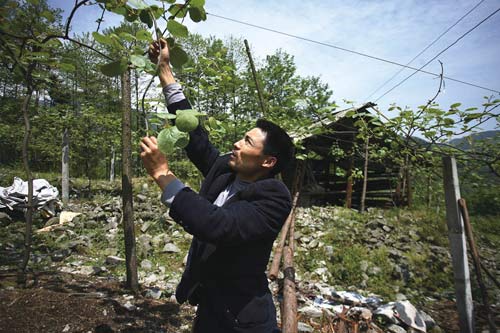In the transformation from an agricultural town to one that will rely on tourism, Hongkou Town was a little later out of the starting blocks than Tai'an Village, which profits from the name of Qingcheng Mountain. But leaders in Hongkou are ambitious and confident of success.
 |
|
Jia Xuewen takes care of his kiwi vines. [Cai Xiaochuan / San Lian Life Weekly]
|
Immediately after the quake, journalists from San Lian Life Weekly arrived at Hongkou Town and found the Zikuan Road that linked Hongkou and Dujiangyan was under repair. The interruption of traffic on this road had severely frustrated quake relief. Large vehicles could not reach Hongkou until May 19th, by which time traffic on all the main roads of Chengdu's quake-affected areas had resumed.
In order to complete repair work before the first anniversary of the May 12 earthquake, the road was closed for construction. The journalists therefore had to walk for an hour and then ride motorcycles into the mountains.
It was a market day. Forty-two year old Jia Xuewen drove his wife to the market by motorcycle, planning to buy some necessities. Eventually he bought nothing but 82-yuan (US$12) of cosmetics for his wife. "Women are fond of make-up - I don't mind how much money she spent on it," said Jia, a tall, lean man.
Jia warm-heartedly invited the journalists to visit his home. After a half-hour ride, the journalists finally arrived at Gaoyuan Village. "This is my home. Come in and have a rest," Jia said, pointing at two shanties. A wooden one was filled with furniture dragged from the rubble, the cement one was divided into two parts--three pigs on one side, a sofa bed on the other.
Jia told the journalists that he lived in a plastic shanty at the foot of the mountain after the quake. He moved to this new location a month ago in order to take care of five mu (1 mu = 666.7 square meters) of kiwi vines that survived the devastating disaster, this being the only hope for the family. Most villagers in Hongkou Town made their livings from kiwi fruit. Two or three households in a village might run family hotels; most still relied on traditional agriculture.
Land can be a stable source for living, but fickle fate always casts a shadow over a peaceful life. Two years ago, Jia's daughter was diagnosed with heart disease and the operation cost 130,000 yuan, which was a severe blow to this simple family. His son did not qualify for a top university last year, and chose to prepare for one more year. Though it would cost more than 10,000 yuan, Jia still supported his choice, because "higher education offers a hope for his life."
Last time we met Gao Yongqiang, vice-head of Hongkou Town, he was busy leading an operation to rescue kiwi plantations. But now, Gao was discussing rebuilding plans with some developers in a teahouse. He told the journalists that post-quake rebuilding had been delayed by snow storms during the winter. Only 30 percent of the town had started rebuilding by April, and the lack of water and electricity in some areas was still serious.
Currently, the shortage of land resources is the bottleneck for Hongkou's rebuilding. Fortunately, its location is helpful: it lies only an hour from the capital city Chengdu, 18 kilometers away from Dujiangyan and close to the Longxi-Hongkou National Reserve - extreme sports such as rafting and rock climbing are becoming popular. The earthquake has devastated the fragile agricultural economy, but strengthened the leaders' ambition to develop tourism.